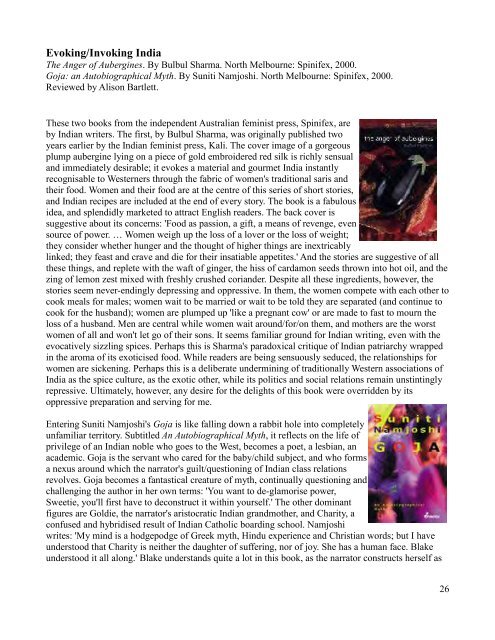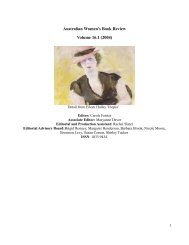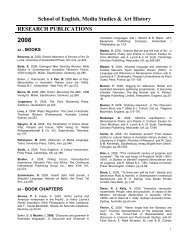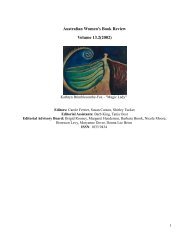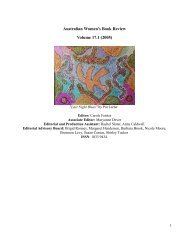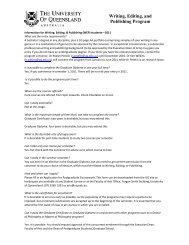Australian Women's Book Review Volume 14.1 - School of English ...
Australian Women's Book Review Volume 14.1 - School of English ...
Australian Women's Book Review Volume 14.1 - School of English ...
Create successful ePaper yourself
Turn your PDF publications into a flip-book with our unique Google optimized e-Paper software.
Evoking/Invoking India<br />
The Anger <strong>of</strong> Aubergines. By Bulbul Sharma. North Melbourne: Spinifex, 2000.<br />
Goja: an Autobiographical Myth. By Suniti Namjoshi. North Melbourne: Spinifex, 2000.<br />
<strong>Review</strong>ed by Alison Bartlett.<br />
These two books from the independent <strong>Australian</strong> feminist press, Spinifex, are<br />
by Indian writers. The first, by Bulbul Sharma, was originally published two<br />
years earlier by the Indian feminist press, Kali. The cover image <strong>of</strong> a gorgeous<br />
plump aubergine lying on a piece <strong>of</strong> gold embroidered red silk is richly sensual<br />
and immediately desirable; it evokes a material and gourmet India instantly<br />
recognisable to Westerners through the fabric <strong>of</strong> women's traditional saris and<br />
their food. Women and their food are at the centre <strong>of</strong> this series <strong>of</strong> short stories,<br />
and Indian recipes are included at the end <strong>of</strong> every story. The book is a fabulous<br />
idea, and splendidly marketed to attract <strong>English</strong> readers. The back cover is<br />
suggestive about its concerns: 'Food as passion, a gift, a means <strong>of</strong> revenge, even<br />
source <strong>of</strong> power. … Women weigh up the loss <strong>of</strong> a lover or the loss <strong>of</strong> weight;<br />
they consider whether hunger and the thought <strong>of</strong> higher things are inextricably<br />
linked; they feast and crave and die for their insatiable appetites.' And the stories are suggestive <strong>of</strong> all<br />
these things, and replete with the waft <strong>of</strong> ginger, the hiss <strong>of</strong> cardamon seeds thrown into hot oil, and the<br />
zing <strong>of</strong> lemon zest mixed with freshly crushed coriander. Despite all these ingredients, however, the<br />
stories seem never-endingly depressing and oppressive. In them, the women compete with each other to<br />
cook meals for males; women wait to be married or wait to be told they are separated (and continue to<br />
cook for the husband); women are plumped up 'like a pregnant cow' or are made to fast to mourn the<br />
loss <strong>of</strong> a husband. Men are central while women wait around/for/on them, and mothers are the worst<br />
women <strong>of</strong> all and won't let go <strong>of</strong> their sons. It seems familiar ground for Indian writing, even with the<br />
evocatively sizzling spices. Perhaps this is Sharma's paradoxical critique <strong>of</strong> Indian patriarchy wrapped<br />
in the aroma <strong>of</strong> its exoticised food. While readers are being sensuously seduced, the relationships for<br />
women are sickening. Perhaps this is a deliberate undermining <strong>of</strong> traditionally Western associations <strong>of</strong><br />
India as the spice culture, as the exotic other, while its politics and social relations remain unstintingly<br />
repressive. Ultimately, however, any desire for the delights <strong>of</strong> this book were overridden by its<br />
oppressive preparation and serving for me.<br />
Entering Suniti Namjoshi's Goja is like falling down a rabbit hole into completely<br />
unfamiliar territory. Subtitled An Autobiographical Myth, it reflects on the life <strong>of</strong><br />
privilege <strong>of</strong> an Indian noble who goes to the West, becomes a poet, a lesbian, an<br />
academic. Goja is the servant who cared for the baby/child subject, and who forms<br />
a nexus around which the narrator's guilt/questioning <strong>of</strong> Indian class relations<br />
revolves. Goja becomes a fantastical creature <strong>of</strong> myth, continually questioning and<br />
challenging the author in her own terms: 'You want to de-glamorise power,<br />
Sweetie, you'll first have to deconstruct it within yourself.' The other dominant<br />
figures are Goldie, the narrator's aristocratic Indian grandmother, and Charity, a<br />
confused and hybridised result <strong>of</strong> Indian Catholic boarding school. Namjoshi<br />
writes: 'My mind is a hodgepodge <strong>of</strong> Greek myth, Hindu experience and Christian words; but I have<br />
understood that Charity is neither the daughter <strong>of</strong> suffering, nor <strong>of</strong> joy. She has a human face. Blake<br />
understood it all along.' Blake understands quite a lot in this book, as the narrator constructs herself as<br />
26


